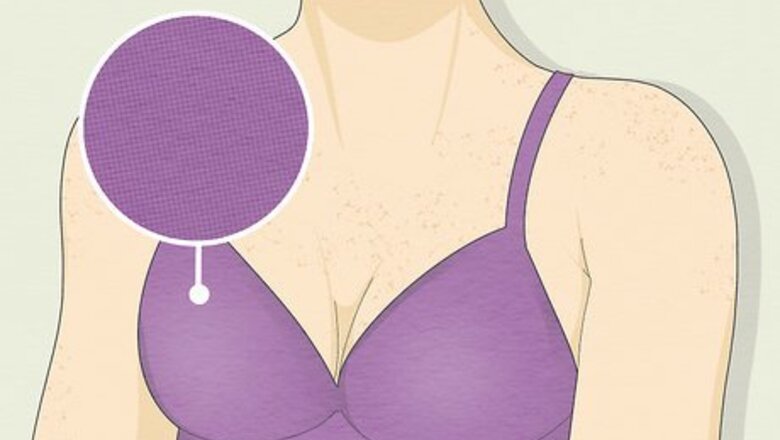
views
Try a moisture-wicking bra.
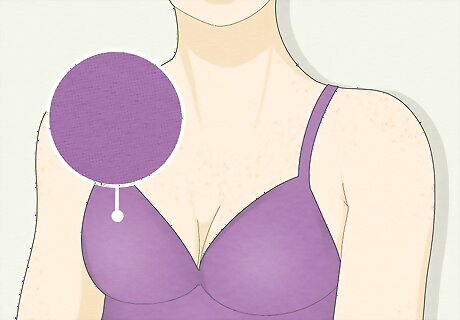
Polyester and nylon bras wick away sweat. According to Lydia Shedlofsky, it's common to experience "irritation in skin folds, usually sweat under a bra band. Try keeping the area dry with wicking materials, avoiding hot or humid environments, and using powders if needed." Invest in some moisture-wicking bras to wear during the summer months to help combat that dreaded underboob sweat. Lots of sports bras are made from moisture-wicking material if you’re looking for a comfy, sporty option.
Wear loose cotton clothing.
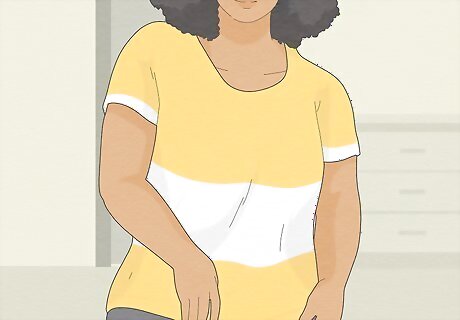
Cotton lets your skin breathe so you don’t sweat as much. When you’re picking out an outfit to wear for the day, go for a flowy cotton shirt that doesn’t cling to your skin. Linen is another great choice when you’re looking for flowy, breathable fabrics.
Use aluminum-free deodorant under your breasts.
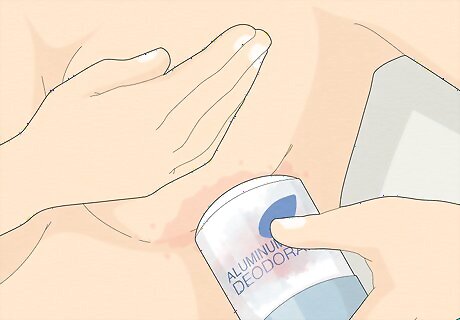
Deodorant helps combat bad smells and underboob chafing. After you get out of the shower, lift up your breasts and apply a few swipes of natural, aluminum-free deodorant. Keep the deodorant in your bag in case you need to reapply throughout the day. If swiping is a little too awkward, find a spray-on deodorant instead. Some companies make deodorant specifically for your underboob area. You can use that, or you can simply use deodorant meant for your armpits—it’s all the same. If you’re looking for a way to sweat less, try an antiperspirant. Deodorants simply mask the smell of sweat, while antiperspirants reduce the amount that you sweat.
Sprinkle on baby powder to prevent chafing.
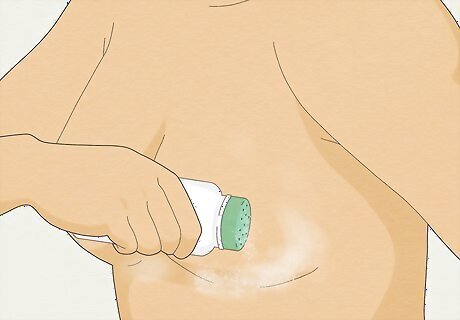
Baby powder wicks away moisture to prevent sweat and smells. Once you’ve showered in the morning, dry your underboob area well and sprinkle on some baby powder. Keep the baby powder with you to reapply throughout the day if you start noticing a smell. Dermatologist Lydia Shedlofsky also recommends choosing "bland cornmeal over complex [drugstore] products." Or, swipe on an anti-chafing gel.
Apply argan oil to reduce sweat.
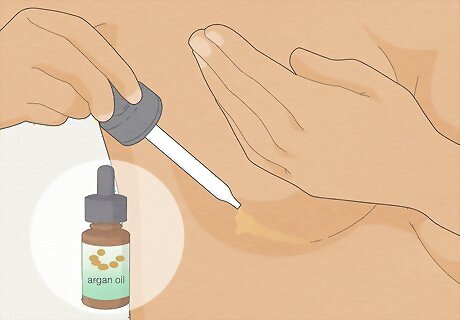
Argan oil naturally hydrates your skin and reduces irritation. The restorative properties of argan oil may be able to reduce your underboob sweat—plus, it’s great for your skin. Apply a few drops underneath each breast after you get out of the shower and before heading out for the day.
Wear a sweat soaker underneath your bra.
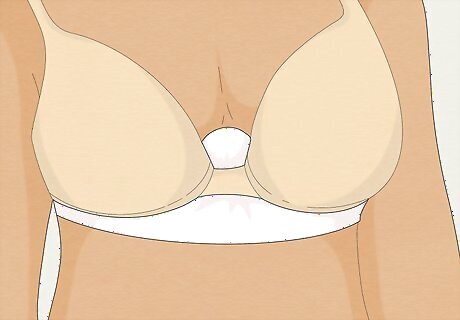
Sweat soakers are cotton strips that absorb boob sweat. If it’s a warm day and you can tell you’re going to sweat, grab a sweat soaker and put it on underneath the bottom of your bra. Leave it there all day, then take it off and wash it whenever you get home. Sweat soakers can also help combat cleavage sweat.
Use baby wipes for a quick refresh.
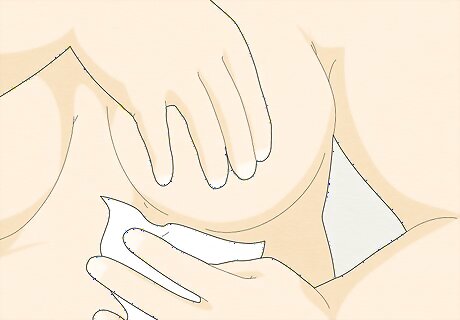
Quickly clean your underboob area with a wet wipe. If you’re out and about and you notice your boobs starting to sweat or smell, head to the bathroom and grab a wipe. Lift up each breast one at a time and quickly wipe the area down, then dry it off with a towel. Baby wipes are made for sensitive skin, so they won’t cause any redness or irritation.
Wick away sweat with panty liners.
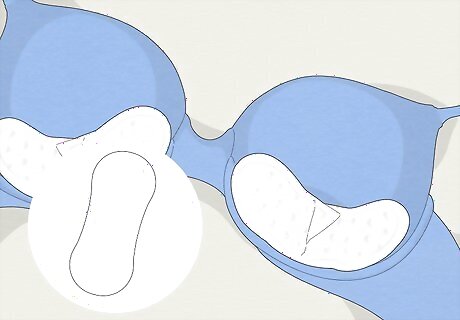
Panty liners absorb moisture, so they can work in a pinch. If you’re out and about and need to quickly solve your underboob smell issue, grab a package of panty liners and place one underneath each breast. At the end of the day, throw the panty liners away. Try to change the panty liners every few hours, or whenever they feel wet with sweat.
Avoid eating garlic or onions.
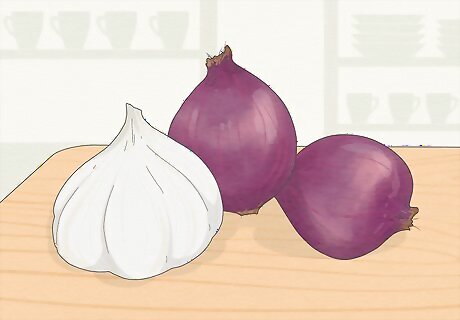
Smelly foods can make your sweat smell worse. Try to avoid garlic, onions, and alcohol if you know you’re prone to smelly body odor. Water-rich foods like watermelon and cucumber can help combat sweat smell and leave you feeling refreshed. Be sure to stay hydrated throughout the day, too! Whitney Bowe Whitney Bowe, Integrative Dermatology Expert Curbing unpleasant scents starts with a holistic view of skin health. Along with gentle cleansing and natural products, consider diet and lifestyle factors. Stay hydrated, avoid foods that worsen odor, like garlic and onions, and wear breathable fabrics to help under-breast skin breathe. With some self-care basics, you can tackle the root causes of odor and moisture build-up. Simple practical steps can make a real difference in promoting fresh, healthy skin everywhere.
Take a shower every day.
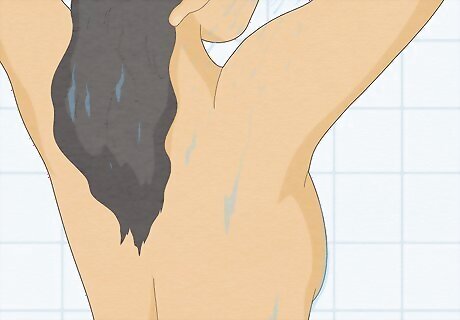
Showering removes the bacteria that causes sweat to smell bad. Make an effort to take a shower every single day, especially during the summer months. Wash with antibacterial soap to really clean underneath your boobs and get rid of sweat and odors.
Wash your bra often.
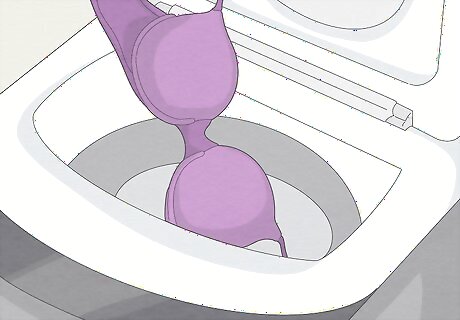
Clean your bras to get rid of sweat and odors. We’re all guilty of wearing a bra for a little longer than we’d like to admit. However, if you’re dealing with underboob sweat, try to wash your bra every day (or at least every other day). This will get rid of the bacteria that causes sweat to smell, so you can start off with a clean, fresh garment to wear. The same goes for your shirts, too. Wearing a dirty shirt can make you smell like B.O., even if you’re fresh and clean.
Talk to a dermatologist if you need to.
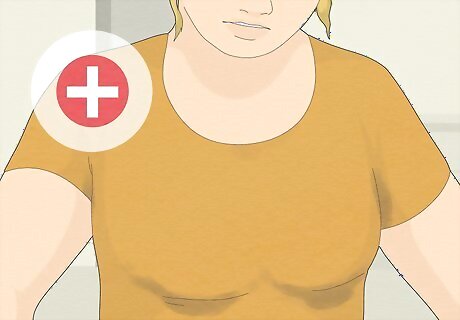
Some sweat problems need to be treated by a professional. If your underboob sweat or smell is impacting your daily life and home remedies aren’t helping, make an appointment with a dermatologist. Dermatologist Lydia Shedlofsky recommends, "if [the smell] is a repeated or ongoing problem lasting more than a week or two, or if it begins to more irritating or itching, then please [go see] a dermatologist." They can tell you about your skin and what might be causing excessive sweat to help you deal with it the right way. In some cases, a smell underneath your breasts is caused by fungus or an infection. Your doctor will be able to tell you what’s going on and prescribe you medicine to deal with it. If there is a rash for more than a week or two, it is better to see a dermatologist.


















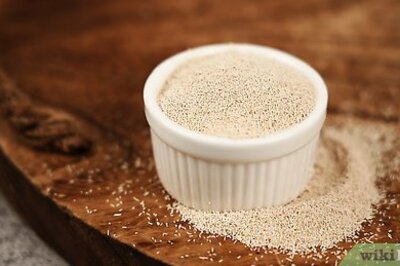

Comments
0 comment